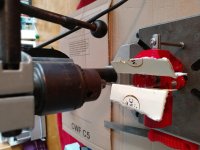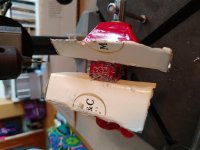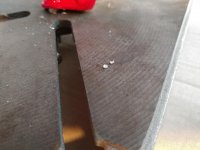That's probably a good idea if you're not confident. Cover the arm with tape to protect its finish before you take it.
sounds like I should take it to a machine shop.
If you attempt this using a handheld electric drill, and do not have the headshell firmly clamped in a vise, then there is a very high chance of the drill bit slipping and causing damage to the aluminum headshell.
On the other hand, if the headshell is firmly clamped, and you use either a drill press, or have a very steady hand, and a sharp drill bit, you are very likely to be successful. Of course it would be best to start with the smallest drill bityou can find, and work your way up in size to one big enough for the easy out to work. The file tang is a great substitute for an easy out.
For small fiddly stuff like this, I have a manual, crank operated drill I use, so I can stop it immediately if something isn't going right.
I support the idea to get a machine shop to do it, if you lack the right tools or skill. All it would take is one small slip up to completely ruin it.
If its a steel bolt in an aluminium headshell then drilling is likely to go wrong unless you clamp everything securely and use a centre-drill.
I do this stuff all the time with hardened steel parts, and a carbide end mill is the way to go, in a mill that is.
Easy job, readily made into a mess with hand held tools and hobby cutting tools that weren’t typically made for steel.
Easy job, readily made into a mess with hand held tools and hobby cutting tools that weren’t typically made for steel.
I once drilled out the core of an aluminum screw that got sheared off inside a Benz cart. I bought the cart that way, mind you, not my doing 😉
Anyway, I first tried cutting a slot into the remaining bit to get some torque on with a screwdriver, but not a chance. The screw had seemingly fused to the threads and the newly formed slot wore down quickly. So I filed down the remaining stump and went to town with the drill press.
After drilling out the core (nerve wrecking) I had to pry the screw's threads from the cart's threads. All in all it went as planned. Just thought I'd share.
Anyway, I first tried cutting a slot into the remaining bit to get some torque on with a screwdriver, but not a chance. The screw had seemingly fused to the threads and the newly formed slot wore down quickly. So I filed down the remaining stump and went to town with the drill press.
After drilling out the core (nerve wrecking) I had to pry the screw's threads from the cart's threads. All in all it went as planned. Just thought I'd share.
Attachments
I once drilled out the core of an aluminum screw that got sheared off inside a Benz cart. I bought the cart that way, mind you, not my doing 😉
Anyway, I first tried cutting a slot into the remaining bit to get some torque on with a screwdriver, but not a chance. The screw had seemingly fused to the threads and the newly formed slot wore down quickly. So I filed down the remaining stump and went to town with the drill press.
After drilling out the core (nerve wrecking) I had to pry the screw's threads from the cart's threads. All in all it went as planned. Just thought I'd share.
You've got the tools. My drill press is far too crude for that sort of work.
Does anyone know what material cartridge bolts are made from? Are they aluminum or steel?
I do this stuff all the time with hardened steel parts, and a carbide end mill is the way to go, in a mill that is.
Easy job, readily made into a mess with hand held tools and hobby cutting tools that weren’t typically made for steel.
So not titanium? What size of bit do you use?
Last edited:
You've got the tools. My drill press is far too crude for that sort of work.
Does anyone know what material cartridge bolts are made from? Are they aluminum or steel?
I've seen both. Steel is more common but you never know
Try a magnet.
Last edited:
I've seen both. Steel is more common but you never know
Try a magnet.
Will do that tonight. Thanks!
I've seen both. Steel is more common but you never know
Try a magnet.
Will do that tonight. Thanks!
I thought as much. So, if stainless, alum will work. How could I tell if the alum is working. Will it discolour quickly?
if stainless, alum will work. How could I tell if the alum is working. Will it discolour quickly?
I haven't ever noticed aluminum cartridge hardware discoloring.
Shure used to supply aluminum screws with their cartridges, and they always looked the same,
even after decades later. Aluminum hardware is much lighter in weight than steel.
No, not necessarily. A bolt's/screw's core diameter (i.e. the threaded hole) is always smaller than it's outer dia.Here is the other side. It looks like the previous owner was forcing a bolt that was too big.
Best regards!
- Home
- Design & Build
- Construction Tips
- Sheared cartridge bolt in headshell


